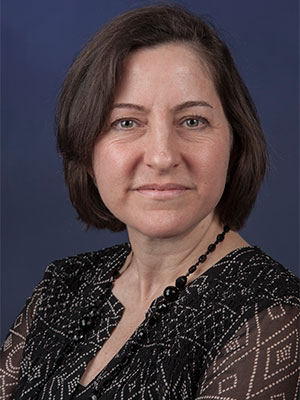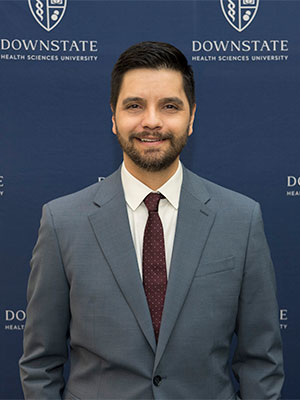Downstate Researchers Awarded Dual NIH Grants to Transform HIV Care
By Office of the President | Oct 21, 2025
Two researchers from the Department of Medicine’s STAR Program at Downstate have received prestigious NIH grants to advance health equity through innovative HIV research. Their projects reflect Downstate’s mission to combine diagnostic innovation with insight into the social factors shaping prevention and care in underserved communities.
 Sabina Hirshfield, Ph.D., Professor in the Department of Medicine/STAR Program, was awarded an NIAID R01 grant
as a multiple principal investigator with engineers at the University of Illinois
Urbana-Champaign. Her five-year project will develop a low-cost, handheld diagnostic
device that quantifies HIV, HBV, and HCV viral loads from a small blood sample in
under 30 minutes. Designed for use outside traditional laboratories, the device will
enable earlier diagnosis, reduce treatment delays, and improve patient outcomes in
resource-limited settings. The project also includes rigorous field validation to
ensure accuracy and usability across diverse populations.
Sabina Hirshfield, Ph.D., Professor in the Department of Medicine/STAR Program, was awarded an NIAID R01 grant
as a multiple principal investigator with engineers at the University of Illinois
Urbana-Champaign. Her five-year project will develop a low-cost, handheld diagnostic
device that quantifies HIV, HBV, and HCV viral loads from a small blood sample in
under 30 minutes. Designed for use outside traditional laboratories, the device will
enable earlier diagnosis, reduce treatment delays, and improve patient outcomes in
resource-limited settings. The project also includes rigorous field validation to
ensure accuracy and usability across diverse populations.
Developed with input from clinicians, community members, and healthcare workers, this “triple test” aims to replace complex lab systems and expand viral load monitoring to community and non-clinical settings with limited access. By aligning technology with real-world needs, Dr. Hirshfield’s work has the potential to transform care delivery for populations facing the most significant barriers to testing and treatment.
 José E. Diaz, Ph.D., Research Assistant Professor in the Department of Medicine/STAR Program, received
an NIMH R21 grant as a multiple principal investigator in collaboration with the New
York Blood Center. His two-year study examines how local and transnational social
networks affect HIV prevention among young Hispanic/Latino immigrant men. The research
will identify trusted messengers and community influencers who can strengthen outreach,
promote testing, and improve linkage to PrEP care. Findings are expected to inform
culturally responsive interventions that reduce stigma and close persistent gaps in
prevention.
José E. Diaz, Ph.D., Research Assistant Professor in the Department of Medicine/STAR Program, received
an NIMH R21 grant as a multiple principal investigator in collaboration with the New
York Blood Center. His two-year study examines how local and transnational social
networks affect HIV prevention among young Hispanic/Latino immigrant men. The research
will identify trusted messengers and community influencers who can strengthen outreach,
promote testing, and improve linkage to PrEP care. Findings are expected to inform
culturally responsive interventions that reduce stigma and close persistent gaps in
prevention.
These awards showcase the STAR Program’s strength in biomedical and social innovation. Dr. Hirshfield expands access to rapid diagnostics through technology, while Dr. Diaz deepens understanding of the social relationships that shape prevention and care. Both projects advance Downstate’s mission to bridge science and society, develop culturally responsive interventions, and deliver discoveries grounded in community realities.
The NIH R01—the agency’s oldest and most prestigious grant—supports mature, large-scale projects with strong potential for public health impact. In contrast, the R21 supports early-stage, high-risk research that tests new ideas and methods. Though smaller and shorter in duration, R21 grants often generate findings that pave the way for larger studies.
These awards demonstrate how Downstate researchers are advancing health equity through both technological innovations that broaden access to care and social science that strengthens community engagement—the simultaneous recognition of Drs. Hirshfield and Diaz underscore the STAR Program’s national leadership and enduring commitment to reducing health disparities.
____________________________________________________
Funder: National Institute of Allergy and Infectious Diseases (NIAID) | Awarded: September 2025 | Duration: 5 years
Project Title: Human factors-designed triple test for HIV, HBV, and HCV infection in whole blood
using target amplification, signal amplification, and crumpled graphene biosensor
readout,
Funder: National Institute of Mental Health (NIMH) | Awarded: September 2025 | Duration: 2 years
Project Title: Influence of social networks on HIV testing and PrEP care among young Latin American
gay, bisexual, and other men who have sex with men.